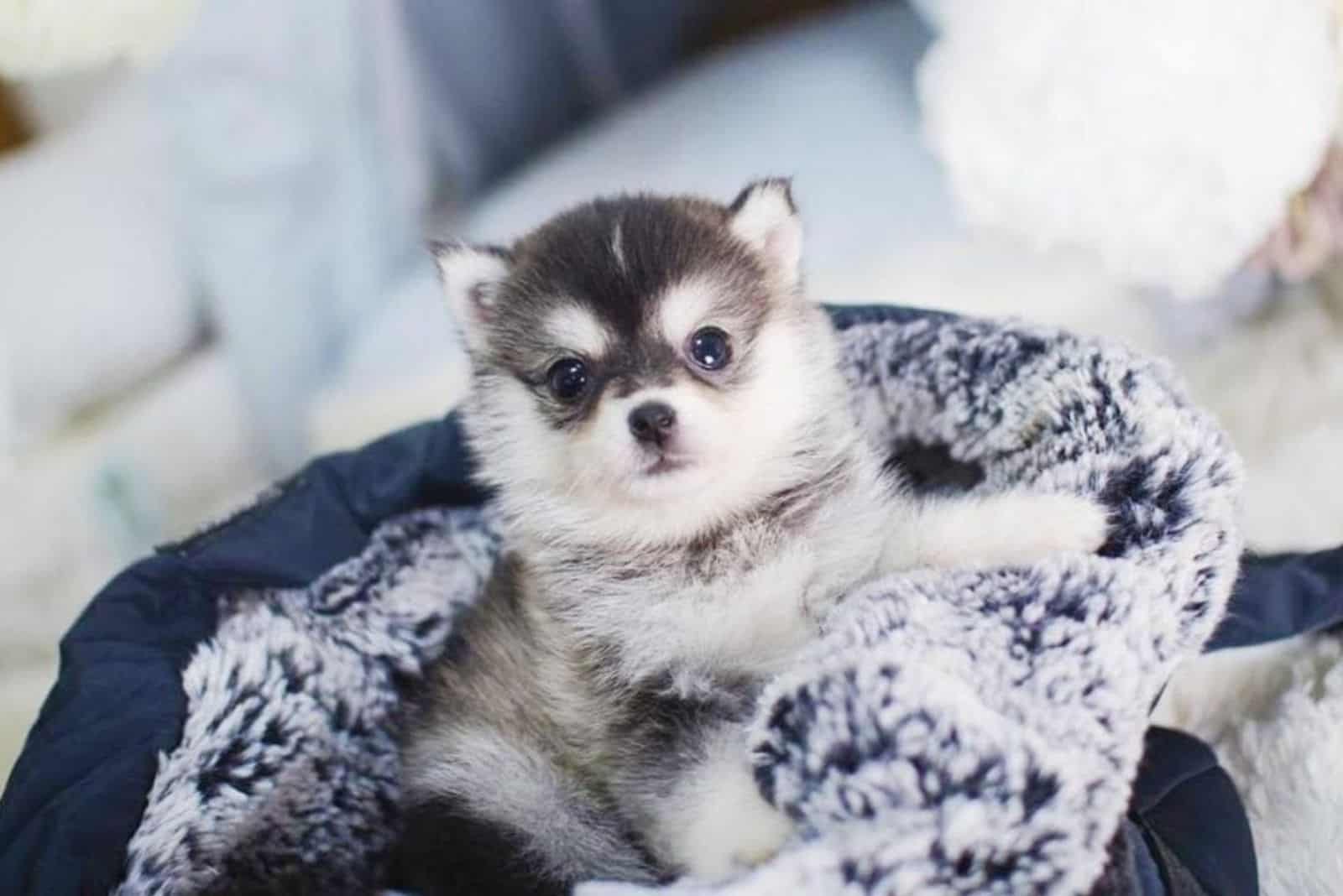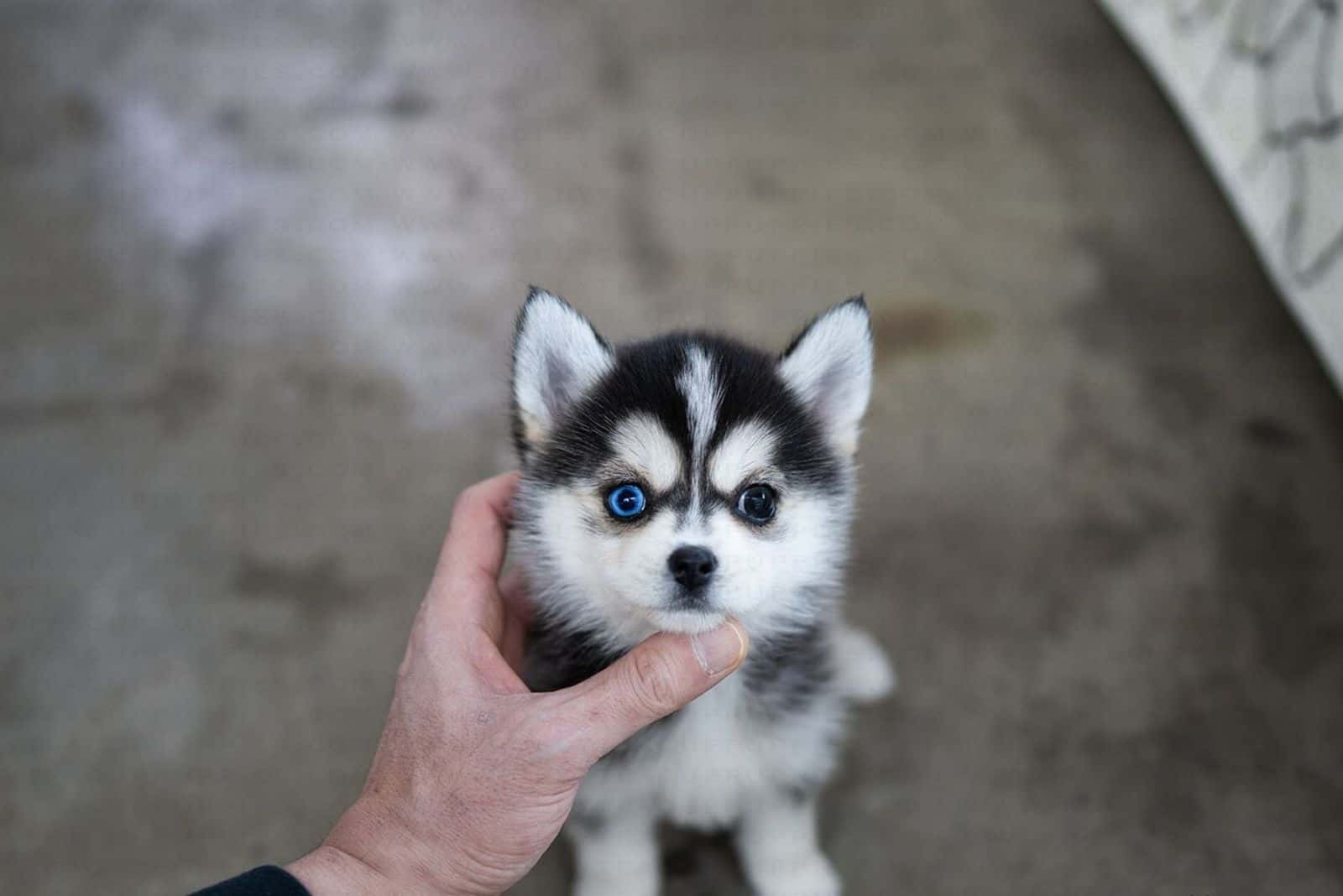Teacup Pomsky: Your Guide To This Tiny Designer Dog
Are designer dogs, with their diverse and often adorable appearances, a testament to human ingenuity and companionship, or do they represent a disregard for ethical breeding practices and the well-being of animals? The teacup pomsky, a relatively new breed, embodies this question perfectly, sparking a debate about the ethics of creating "miniature" versions of existing breeds.
The teacup pomsky, also affectionately known as the miniature or toy pomsky, is a fascinating example of a relatively recent trend: the deliberate creation of designer dog breeds. This pint-sized pup is the result of crossing two already popular breeds: the Pomeranian and the Siberian Husky. The goal? To capture the striking, almost wolf-like appearance of the Husky in a smaller, more manageable package, all while maintaining the fluffy charm of a Pomeranian.
The allure of the teacup pomsky is undeniable. These dogs boast a unique blend of characteristics from their parent breeds. They often inherit the striking blue eyes and distinctive facial markings of the Siberian Husky, combined with the compact size and plush, double coat of the Pomeranian. They are frequently described as adorable, captivating, and possess a charm that can melt the hearts of even the most stoic individuals. However, beneath the surface of cuteness lies a complex story, one that raises ethical considerations and practical challenges for potential owners.
| Teacup Pomsky: Vital Statistics | |
|---|---|
| Origin: | United States (circa 2009) |
| Breeding: | Cross between a Pomeranian and a Siberian Husky. Teacup size achieved through selective breeding of the smallest individuals. |
| Size: | Typically smaller than standard Pomskies. Size can vary, but the goal is to achieve the smallest possible size. |
| Weight: | Generally ranges from 4 to 12 pounds, although this can vary. |
| Coat: | Thick, double coat inherited from both parent breeds. Coat colors and patterns vary widely, reflecting the diverse genetics. |
| Lifespan: | Generally 12 to 15 years, but this can be influenced by health and care. |
| Temperament: | Can vary, but often described as friendly, outgoing, playful, and intelligent. However, they can inherit traits from both parent breeds, potentially leading to challenges. |
| Health Concerns: | Prone to health problems common to both parent breeds, as well as those associated with their small size. These may include: Hypoglycemia, tracheal collapse, luxating patellas, heart defects, and dental issues. |
| Training: | Requires consistent training and socialization from a young age. Due to their intelligence, they can learn quickly. |
| Care: | Requires regular grooming to maintain their double coat. Regular exercise and mental stimulation are also essential for their well-being. |
| Cost: | Teacup Pomskies are typically expensive, often costing several thousand dollars. |
| Reference: | American Kennel Club (AKC) - Designer Dogs |
The teacup pomsky's popularity surged in the United States, particularly around 2009, fueled by the desire for a small, cuddly companion with a unique aesthetic. However, the creation of the teacup size presents particular challenges. Breeders typically achieve this by selecting and breeding the smallest individuals from successive litters of Pomskies. This practice, while potentially resulting in the desired diminutive size, also raises significant concerns about the dogs' health and well-being. The process often involves breeding dogs that are already at the lower end of the size spectrum, which can exacerbate genetic predispositions to certain health problems.
The "itty bitty" nature of the teacup pomsky, as it is sometimes affectionately called, means they are even more fragile than a standard-sized Pomsky. Their small stature can make them susceptible to a range of health issues, including but not limited to: Hypoglycemia (low blood sugar), which is common in small breeds; tracheal collapse, a condition where the trachea weakens; luxating patellas, where the kneecaps dislocate; heart defects; and dental problems. These health concerns can result in significant veterinary bills and potentially shorten the dog's lifespan, making it essential for potential owners to be aware of the potential risks.
Furthermore, the breeding practices used to achieve the teacup size can sometimes prioritize appearance over health and temperament. The breeders who emphasize the size often overlook genetic predispositions, which leads to offspring with increased health risks. Responsible breeding, on the other hand, prioritizes the health of the parent dogs and the puppies, reducing the likelihood of inherited diseases.
The teacup pomsky's temperament is another factor to consider. While they are often described as friendly and outgoing, their personalities can vary depending on their lineage and individual experiences. Due to the parent breeds being crossbred, they can inherit a mixture of personality traits from Pomeranians and Siberian Huskies. The Pomeranian side contributes to their playful nature, while the Husky influence can result in a more independent and sometimes even challenging personality. Proper socialization and training are essential to ensure they develop into well-adjusted companions.
Beyond the breed's characteristics, there are also ethical considerations to reflect upon. The desire for specific physical traits, such as smaller size, can sometimes lead to practices that compromise the health of the animals. The process of breeding for extreme traits is often driven by market demand, where appearance is prioritized over the well-being of the dog. This can promote unethical practices and may encourage the production of animals with congenital defects.
The cost of a teacup pomsky is a significant factor. Due to their perceived rarity and the effort and expense involved in breeding them, these dogs often command a high price, sometimes several thousand dollars. This cost reflects not only the demand for the breed but also the resources that breeders invest in the process. This cost, however, can be misleading. High prices can attract individuals who may not prioritize ethical breeding practices. This financial commitment makes it crucial for potential owners to perform thorough research and to buy only from reputable breeders.
Before acquiring a teacup pomsky, potential owners must be prepared to provide a high level of care. Because of their size, teacup pomskies are more susceptible to certain health issues and may require specialized care. They need a nutritious diet designed for small breeds, regular exercise, and routine veterinary check-ups. Regular grooming is also essential to maintain their double coat and prevent matting. Moreover, owners must be dedicated to socialization and training from an early age. Their intelligence and energy levels require a consistent approach to ensure that they are well-behaved and well-adjusted.
The debate around designer dogs is ongoing. Some argue that these breeds represent a positive evolution in the world of companion animals, providing unique and desirable traits. Others express serious concerns about the ethical implications of breeding for specific physical characteristics, especially when it compromises the health and well-being of the animals. As with any dog breed, responsible ownership is key. Potential owners should carefully research the breed, find reputable breeders, and prepare themselves for the responsibilities that come with owning a teacup pomsky.
Ultimately, the decision of whether or not to welcome a teacup pomsky into your life is a personal one. Weighing the charming aspects of these miniature dogs against the potential risks and ethical concerns is crucial. Before making a decision, potential owners should carefully consider the needs of the dog, the financial implications, and the level of commitment required to provide proper care. The teacup pomsky, despite its undeniable cuteness, is a testament to the complex and often controversial world of designer breeds. The debate continues, and informed decisions are always the best path forward.


